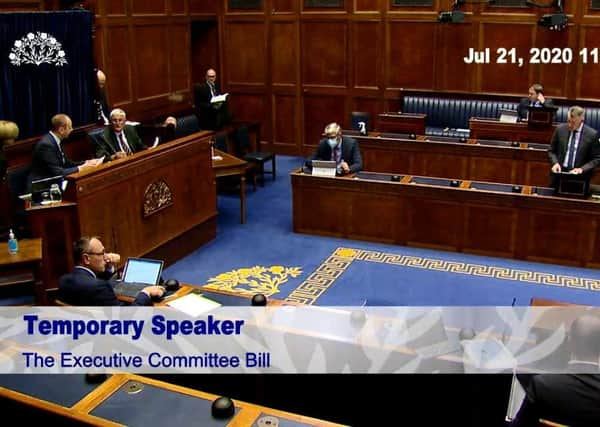Despite serious concerns, Assembly takes just 10 minutes to nod through bill to give ministers more power


This morning MLAs came to debate the Executive Committee (Functions) Bill, legislation involving the complex intersection of statute, case law and politics, and an area with profound implications because it alters both the Good Friday and St Andrews agreements.
However, despite several concerns having been raised about the entire basis of the bill, no amendments to the proposed legislation were tabled by any MLA and there was no debate whatsoever on any of the clauses of the new law as the Assembly spent just 10 minutes on the issue.
Advertisement
Hide AdAdvertisement
Hide AdDespite Arlene Foster nor Michelle O’Neill having jointly brought forward the bill, neither of them were even present in the chamber, leaving it to Sinn Fein junior minister Declan Kearney to move the bill.
At the first and deputy first ministers’ request, the bill is being rushed through the Assembly with reduced scrutiny and is likely to pass its final Assembly stage next week.
MLAs have only until 9.30am tomorrow to table amendments to the bill for further consideration stage – the final point at which changes can be made.
Mrs Foster’s former special adviser Richard Bullick has for more than a week been speaking out about what he sees as serious problems with the bill – itself highly unusual, because he has not been critical of the DUP since leaving his role as Mrs Foster’s adviser three years ago.
Advertisement
Hide AdAdvertisement
Hide AdMr Bullick, a trained lawyer who for years was the DUP’s key internal adviser on legal matters as well as having been central to the negotiation of the 2006 St Andrews deal which the DUP used to justify sharing power with Sinn Fein, has argued that it represents “the most significant rolling back of the St Andrews Agreement”.
And it appears that the basis of Mrs Foster’s support for the bill is an erroneous belief that any three Executive ministers will be able to call into the Executive any significant decision, thus allowing the DUP to block it – something which Mr Bullick has said has no legal basis, a devastating observation which Mrs Foster has failed to address.
None of those criticisms were answered, or even acknowledged, in yesterday’s whirlwind Assembly proceedings.
The only brief question came from the UUP’s Doug Beattie, who asked Mr Kearney if the legislation only related to the powers of the minister responsible for planning, rather than extending to every Executive minister.
Advertisement
Hide AdAdvertisement
Hide AdAfter a significant pause in which he leafed through a file of briefing material, Mr Kearney responded with a long and technical answer which did not clearly answer the question: “It is necessary to clarify that the circumstances in which a minister is required to refer a matter to the Executive, where that matter may be cross-cutting, significant or controversial [sic] – what I want to add is that does not affect the integrity of the planning process itself or the nature or the quality of the decisions that would be taken under it. It is about who takes the decisions.
“So, to the particular point raised by the member, clause 1 (4) inserts a new provision as section 20 paragraph seven of the NI Act. And that permits the Department for Infrastructure or the minister in charge of that department to take certain decisions under the Planning Act without recourse to the Executive Committee.
“However, there is then a caveat to be entered under clause 1 (8) which qualifies section 20 paragraph 3 of the act in respect of cross-cutting matters to provide that a minister is not required to have recourse to the Executive Committee unless a matter affects the exercise of one or other ministers’ more than incidentally.”
Only the Ulster Unionists and People Before Profit’s Gerry Carroll voted against the bill in an oral vote, but the weight of votes in favour from the rest of the chamber meant that there was not a recorded vote and the entire bill passed consideration stage on an oral vote.
Read More:
Advertisement
Hide AdAdvertisement
Hide Ad——— ———
——— ———
A message from the Editor:
Thank you for reading this story on our website. While I have your attention, I also have an important request to make of you.
With the coronavirus lockdown having a major impact on many of our advertisers — and consequently the revenue we receive — we are more reliant than ever on you taking out a digital subscription.
Subscribe to newsletter.co.uk and enjoy unlimited access to the best Northern Ireland and UK news and information online and on our app. With a digital subscription, you can read more than 5 articles, see fewer ads, enjoy faster load times, and get access to exclusive newsletters and content. Visit https://www.newsletter.co.uk/subscriptions now to sign up.
Advertisement
Hide AdAdvertisement
Hide AdOur journalism costs money and we rely on advertising, print and digital revenues to help to support them. By supporting us, we are able to support you in providing trusted, fact-checked content for this website.
Alistair Bushe
Editor